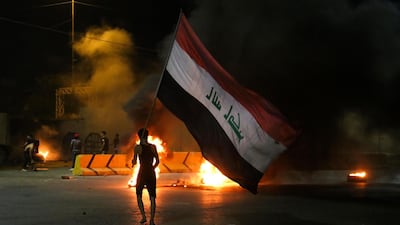Diplomats in Iraq are insisting that perpetrators of targeted killings of activists and journalists are brought to justice, as concerns mount over the frequency of attacks.
Widespread anger has gripped the country following the brutal killing of activist Ihab Al Wazni on Sunday morning in the southern holy city of Karbala and the attempted assassination of reporter Ahmed Hassan on Monday.
The attacks were less than 24 hours apart.
“Impunity for the killing of activists since October 2019 has only led to more deaths,” the British ambassador to Iraq, Stephen Hickey, said.
“There is an urgent need for concrete measures to hold perpetrators accountable and protect Iraqi citizens as they prepare for elections in October,” Mr Hickey said.
Since the start of the protest movement in October 2019 dozens of activists, journalists and members of civil society groups have been assassinated, kidnapped and threatened.
The movement calls for more employment opportunities, better public services and an end to corruption.
The government has been under pressure to find and punish the killers of activists calling for reforms, but little has been done.
“Insisting on accountability for murders like that of Ihab Al Wazni is not a hollow call,” said Martin Huth, the European Union’s ambassador to Iraq.
“Killers challenge the state, threaten and bully Iraqi society, and sabotage the political course of the entire country,” Mr Huth said.
Al Wazni was known as the “hero of Karbala” where he was well known in the protest movement, even as Iran-backed militia groups grew in strength and continued to murder activists.
He was shot dead near his home by men on motorbikes using a gun equipped with a silencer. The act was caught on surveillance cameras.
His death has sparked outrage at the lack of action taken by authorities to protect civilians and provide them with basic public services.
Al Wazni escaped death in December 2019, when men on motorbikes used silenced weapons to kill fellow activist Fahem Al Tai as he was dropping him home in Karbala.
The attack occurred only two months after the start of the protests. Many activists on social media blamed Iran-backed militias for his killing.
In reaction to his death, protests broke out in Karbala, Nassiriya and Diwaniya in southern Iraq, as people called for an end to the bloodshed and to rampant corruption.
Protesters blocked roads and bridges with burning tires and set fire to trailers belonging to Iran’s consulate in Karbala.
Hours after Al Wazni’s death, reporter Ahmed Hassan was put in intensive care after receiving "two bullets in the head and one in the shoulder," doctors told local news outlets.
Witnesses said that Mr Hassan "was targeted as he got out of his car to go home," in Diwaniya in the south of the country.
The protest movement has been directed at the post 2003 political system and an elite class that Iraqis accuse of pillaging Iraq’s wealth while the country grows poorer.
But protesters have also directed their rage at neighboring Iran and the powerful Iraqi Shiite militias tied to it, many of whom also have close ties to Iraqi political parties.
Protesters were met with overwhelming force in October 2019 and the ensuing months, which resulted in the death of at least 550 people and injuries of thousands more.
Since then, violence on the streets has declined but militias have opted for a strategy of killing of protest movement leaders.













